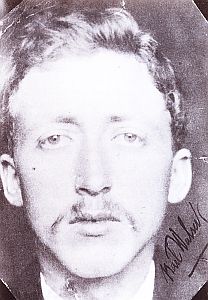Top Qs
Timeline
Chat
Perspective
Karl Walser
Swiss painter, stage designer, illustrator, muralist and artist From Wikipedia, the free encyclopedia
Remove ads
Karl Edmund Walser (April 8, 1877, Teufen - September 28, 1943, Bern)[1][2] was a Swiss painter, stage designer, illustrator, muralist, and artist.[citation needed] He was the older brother, by one year, of the writer Robert Walser, and provided illustrations for Robert's first book Fritz Kocher's Aufsätze (1904). He was a close friend of German expressionist painter Max Beckmann, who strongly influenced his work.[citation needed]
You can help expand this article with text translated from the corresponding article in German. (March 2009) Click [show] for important translation instructions.
|
Remove ads
Life and career
Summarize
Perspective
Karl Walser was born in Teufen, on April 8, 1877,[1] to Adolf Walser and Elisa Marti Walser who had 7 children.[citation needed] He grew up in Biel.[3]
He completed an apprenticeship as a decorative artist in Strasbourg and Stuttgart.[1] Most of Walser's earlier works were lost during World War II.[citation needed]
Between 1899 and 1914 he lived in Berlin and became a board member of the Berlin Secession (1903) and later a member of the Deutsche Künstlerbund (German Artists’ Association).[1]
While in Berlin, he worked as an illustrator for the publisher Bruno Cassirer and designed the majority of his book illustrations. He also completed murals for the private residences of renowned figures. In addition to several study trips to Belgium, France, Spain, Italy and Japan, Karl Walser produced stage sets for opera and theatre from 1903. He also received commissions for book cover designs and book illustrations.[1]
In 1910 he married Hedwig Agnes Czarnetzki Walser (1885-1987).[citation needed]
He returned to Switzerland in 1917 and mainly worked on the painterly decoration of public spaces, such as the Amtshaus in Zurich, the Stadttheater in Bern and the Grossratssaal at Bern City Hall.[1]
He died in Bern, on September 28, 1943. He was buried at the Schosshalden Cemetery in Bern.[citation needed]
Remove ads
References
External links
Wikiwand - on
Seamless Wikipedia browsing. On steroids.
Remove ads

